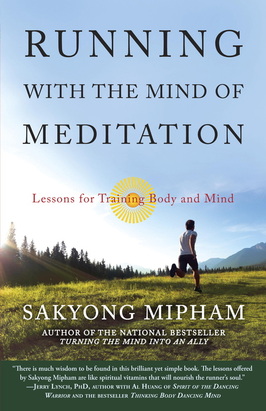
Running with the Mind of Meditation by Sakyong Mipham
I originally bought this as a birthday gift for a friend who I knew had started meditating (the same friend, incidentally, who should be credited as having got me out on regular fitness runs in the first place. Note the term ‘fitness’ run; e.g., before I developed into an ‘obsessional’ runner and back in the day when 2 km round a lake near Warrington was a significant challenge!) As I had the book a little ahead of time, I started but didn't finish reading it before the birthday. I guess it’s credit enough that I ended up buying a second copy for my friend so I could keep reading, and even more so that I currently have that second copy back on loan to reread, having lent my own copy to someone else! Enough confusing detail on the bibliographic arrangements of my social running network and on to a bit more about the book.
You’d probably need to have been living in seclusion as a Zen Master to have avoided all the discussion about ‘mindfulness’ and ‘being in the moment’ that’s currently caught the attention of the zeitgeist through popular media, in which case you probably don’t need this book anyway. Unless, of course you’re about to start running, in which case, buy it because you’ll find that what Mipham does is skilfully apply these mental and spiritual principles to a relationship with the physical body, especially the negative habits and pitfalls of the mind during the act of running. It goes a bit beyond ‘positive thinking’ however, and links these psychological tools with the mechanics of running dynamics through awareness of breathing. Now, you might feel that you don’t need anyone to instruct you on how to breathe but trust me, if you breathe right, you run right, and you might be surprised what a difference being more aware of this usually unconscious reflex makes.
It’s not an uncommon statement that running is 'x' percent mental (insert your preferred value here!) and when I first read the book, I certainly found some of the content helped me mentally manage the tougher runs. This was especially true of the darker moments on the standard Sunday LSR (Long Slow Run) when I was holding off the gel for another mile but could feel my focus slipping. That’s just me and my runs though and I’m sure the same will be equally so for runners who are targeting shorter distances or maybe doing them a bit quicker. I also linked it to an increasing awareness of the advantages of engaging in regular yoga practice, which I initially started to enrich my core and strength building work. There was a distinct parallel in the cultural link to the Eastern philosophies and I found it expanded on the same benefits of linking the physical and mental selves that I had already identified through yoga. The book certainly didn't turn me into a meditator, but then it doesn't try to; it maintains accessibility by referring to but not being overtly religious or preachy and makes a clear distinction between running and meditating. In fact, Mipham clearly states that they are two very different things, despite the assertion of many runners that ‘running is my meditation’, which was indeed my own perspective for quite some time. Interestingly, though I first read this as a runner, I have now started exploring the act of meditation to help manage stress and anxiety so I’m now re-reading it from the other perspective which is proving just as informative.
Essentially, this is an interesting take on some of the psychological aspects of running but it won’t necessarily be for everyone. It’s certainly an interesting read however, especially if you’re already engaged in a yoga practice, are considering meditation and mindfulness as tools for managing other areas of your life, or are looking for a new angle on coping with mentally challenging workouts!
I originally bought this as a birthday gift for a friend who I knew had started meditating (the same friend, incidentally, who should be credited as having got me out on regular fitness runs in the first place. Note the term ‘fitness’ run; e.g., before I developed into an ‘obsessional’ runner and back in the day when 2 km round a lake near Warrington was a significant challenge!) As I had the book a little ahead of time, I started but didn't finish reading it before the birthday. I guess it’s credit enough that I ended up buying a second copy for my friend so I could keep reading, and even more so that I currently have that second copy back on loan to reread, having lent my own copy to someone else! Enough confusing detail on the bibliographic arrangements of my social running network and on to a bit more about the book.
You’d probably need to have been living in seclusion as a Zen Master to have avoided all the discussion about ‘mindfulness’ and ‘being in the moment’ that’s currently caught the attention of the zeitgeist through popular media, in which case you probably don’t need this book anyway. Unless, of course you’re about to start running, in which case, buy it because you’ll find that what Mipham does is skilfully apply these mental and spiritual principles to a relationship with the physical body, especially the negative habits and pitfalls of the mind during the act of running. It goes a bit beyond ‘positive thinking’ however, and links these psychological tools with the mechanics of running dynamics through awareness of breathing. Now, you might feel that you don’t need anyone to instruct you on how to breathe but trust me, if you breathe right, you run right, and you might be surprised what a difference being more aware of this usually unconscious reflex makes.
It’s not an uncommon statement that running is 'x' percent mental (insert your preferred value here!) and when I first read the book, I certainly found some of the content helped me mentally manage the tougher runs. This was especially true of the darker moments on the standard Sunday LSR (Long Slow Run) when I was holding off the gel for another mile but could feel my focus slipping. That’s just me and my runs though and I’m sure the same will be equally so for runners who are targeting shorter distances or maybe doing them a bit quicker. I also linked it to an increasing awareness of the advantages of engaging in regular yoga practice, which I initially started to enrich my core and strength building work. There was a distinct parallel in the cultural link to the Eastern philosophies and I found it expanded on the same benefits of linking the physical and mental selves that I had already identified through yoga. The book certainly didn't turn me into a meditator, but then it doesn't try to; it maintains accessibility by referring to but not being overtly religious or preachy and makes a clear distinction between running and meditating. In fact, Mipham clearly states that they are two very different things, despite the assertion of many runners that ‘running is my meditation’, which was indeed my own perspective for quite some time. Interestingly, though I first read this as a runner, I have now started exploring the act of meditation to help manage stress and anxiety so I’m now re-reading it from the other perspective which is proving just as informative.
Essentially, this is an interesting take on some of the psychological aspects of running but it won’t necessarily be for everyone. It’s certainly an interesting read however, especially if you’re already engaged in a yoga practice, are considering meditation and mindfulness as tools for managing other areas of your life, or are looking for a new angle on coping with mentally challenging workouts!

